
Homeowners that refinance in the time can avoid expensive mistakes. You must factor in your motivation and needs, the states of the real estate market, the current economy and the cost of real estate. An initial financial advantage might be attractive, but refinancing requires some research to make an educated choice. Before refinancing, consider your particular situation to find out if it’s the right time for you.
Definition
A refinance occurs when a lender pays off your current mortgage and issues using a new mortgage using fresh provisions. The length, type of loan and interest rate could differ from those of your previous mortgage. You reset the clock on your mortgage when you refinance. With that in mind, it is critical to get a refinance at the right time to best benefit your own situation.
Motivation
The time to refinance often is based on the motivation of the homeowner. Homeowners may be prompted to conserve money, so they refinance to reduce their monthly payments. During a recession, homeowners can lose their jobs or take lower paying places. A brand new mortgage with the same term as the current one could reduce monthly payments, allowing those homeowners to keep their homes. Homeowners are also sometimes encouraged to refinance according to a private financial need or even a pressing financial circumstance. For them, that’s the right time to refinance. As an example, they may need cash out to pay for school, remodeling or vacations. Significant home equity must be built up until a homeowner can refinance to get cash out.
Consequences
Before deciding on a refinance, understand the results. If you refinance to pay off or consolidate unsecured debt, then you end up with new debt built into your home loan. The debt which was unsecured now becomes secured by your property. Your new mortgage payments could be higher. If refinancing with an interest rate higher than that in your current mortgage, you will likely pay higher monthly mortgage payments and more interest over the duration of the loan.
Reasons
Homeowners often feel the right time to refinance is when interest rates are low. If accepted for a lower interest rate loan compared to that of their current mortgage, monthly mortgage payments should be less and the homeowner must save significantly over the duration of the loan. Other reasons homeowners refinance would be to consolidate credit card debt, combine two mortgages, remove private mortgage insurance and purchase real estate.
Hazards
Refinancing always presents dangers even when interest rates are low. Property values could decline and you could end up owing more in your home than it is worth. When you refinance, you take the risk that you will be able to afford the mortgage payments for the length of the new loan. Economic or other challenges could put you in danger of losing your home, such as unexpected health difficulties, losing your job or losing your spouse through death or divorce. If you get a brand new mortgage, rather of an adjustable rate, you reevaluate some of the risk involved in refinancing.